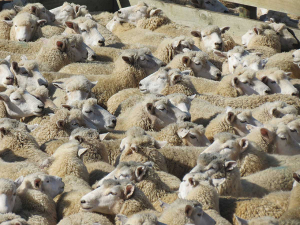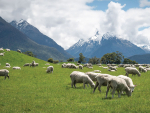Facial Eczema (FE) is caused by spores of a fungus growing on the litter in the base of the sward.
These release a toxin which attacks the liver. It is a serious disease that affects sheep and cattle and can be fatal.
Your losses will be much greater than they appear. FE, when no symptoms are visible, can reduce lifetime productivity by up to 25%.
There are practical ways in which you can reduce your losses. Farmers should use two or three methods together.
Breeding for increased tolerance to FE should be your first line of defence.
Buying FE-tolerant rams will make a great difference in only a few years, but you have to be consistent in only bringing tolerant rams into your flock.
You can give all or part of your flock a zinc bolus, which lasts six weeks, or dose with zinc-oxide or fortnightly to reduce liver damage. For large numbers, you can spray zinc on pasture.
Quit stock early, build up feed reserves, and aim for light rotational grazing. Most vet clinics have a spore counting service. If one is not available, get together with other farmers and organise a spore counting service (persuade your vet clinic to offer the service, hire someone to do the counts).
Spore counts will help you identify the safer parts of the farm (the shady, windy places). Fungicide sprayed before the onset of FE season will reduce spore counts for five to six weeks.
Use these pastures for your replacement ewe lambs and hoggets. Aim to be likely stocked through the danger period.
Neighbouring farmers should get together to share knowledge and hear advisers. Don't relax precautions too soon - a few cool nights or heavy rain doesn't mean danger has passed.
Once spore counts rise, pastures remain toxic until the spores disappear. Faecal spore counting offers a method of determining how much challenge has occurred to the animals.
FE Checklist
Know the danger periods and at risk pastures:
- Be vigilant during danger periods - January to May in most years.
- Identify danger to animals from spore counts - on farm or local.
Use historical records to identify most at risk paddocks.
Breeding animals for FE tolerance is a medium to long term strategy that:
- Underpins other protective measures.
- Can achieve significant tolerance in 5-10 years if managed well.
- Requires consistent use of rams bred from tested and certified sites, from breeders using Ramguard.
Protecting animals with zinc:
- Has a prophylactic effect in animals for FE protection.
- Can be administered to sheep and cattle as a zinc oxide bolus or drench.
- Is also effective if sprayed on pasture animals that are grazing.
- Can be administered to cattle via the water supply.
Management during danger periods:
- Use alternative crops such as chicory.
- Practice lax grazing to avoid the toxic spores concentrated in the base of the sward.
- Identify "safe" pasture from historical records and pasture spore counting.
Source: Beef+Lamb NZ's 'Facing up to facial eczema' booklet.



















